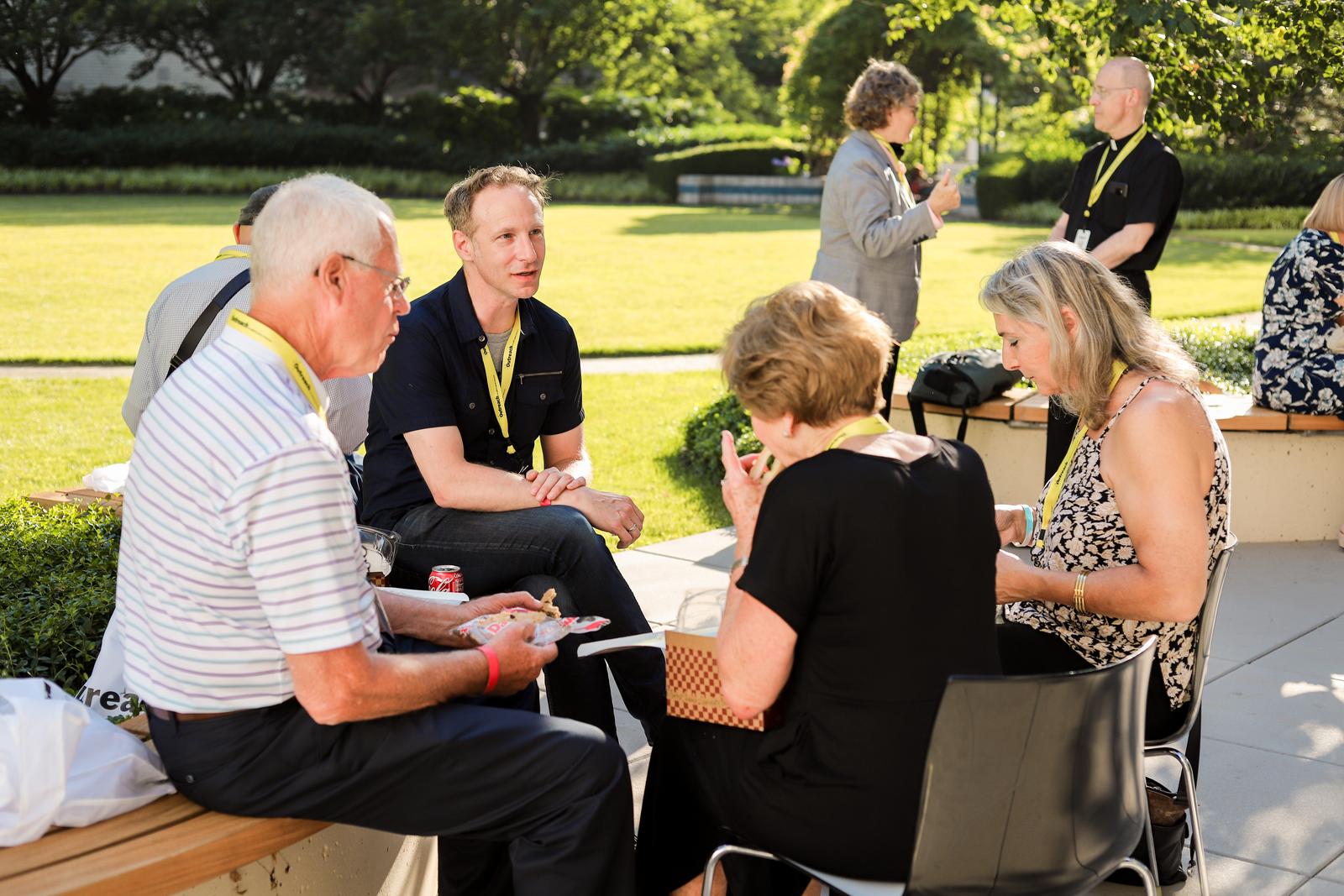Outreach was honored to receive this unexpected appreciation of our ministry from a distinguished moral theologian. We present it here to mark our first anniversary week.
In the field of moral theology, or what many of us today call “theological ethics,” the concepts of vulnerability and recognition are getting much attention, and rightly so. I hope to share with you why the two terms are so relevant, and how I think they are key for appreciating the Outreach community and its platform.
Vulnerability
Following the philosopher Judith Butler, ethicists use vulnerability not to signal weakness or incapacity or being-in-need. Rather, we highlight the original sense of vulnerability as the capacity to be open to another even to the point that one could be wounded. The word comes from the Latin word vulnus, for wound.
Vulnerability does not mean having been wounded, but rather the capacity to be wounded. It is good to distinguish, as Butler does, vulnerability, which is about an open capacity to connect or respond, from precarity, which is about being in an unstable situation or condition.
For instance, in the Parable of the Prodigal Son (Lk. 15:11-32), the vulnerable person in the story is the father, who waits for and welcomes back his younger, precarious son. The same father is also vulnerable to his older resentful son, with whom he tries to engage. Indeed, the father’s vulnerability is the heart of the story.
In the Good Samaritan parable (Lk. 10:25-37), the wounded man lay there in all his precarity, but it is the Good Samaritan, unlike the priest and the Levite, who is vulnerable to wounded man’s situation.
Indeed, the act of coming out is an extraordinarily vulnerable moment, allowing a person to reveal themselves as they truly are.
Jesus offered the Parable of the Good Samaritan as an answer to the question: “Who is my neighbor?” In the beginning of the parable, we could think that Jesus is suggesting that the wounded man lying on the road is the neighbor, but by the end of the story, we realize that the neighbor is the one who showed mercy.
In a similar way, we might think that the man lying on the road is vulnerable, but the truly vulnerable one is the Good Samaritan, whose openness leads him to stop and enter into the chaos of the wounded man’s precarity. In fact, the Samaritan’s vulnerable response is what prompts us to recognize him as neighbor.
Butler writes a good deal on vulnerability. She describes it as the ontological capacity that we have to be morally responsive to another human being. It is so fundamental in us that, if we hear a cry for help, it awakens in us a capacity to respond whether we know the person or not.
In fact, that is why we do cry out: because we believe that others might be responsive. We are programmed that way to know and expect a response from a fellow human being. The moral issue in life is then: Will we be vulnerable to the other? Will we recognize and respond to them?
Outreach as an exercise in vulnerability
I think Outreach is, in itself, an exercise in vulnerability. One reason why it is such an exercise in vulnerability is that it is responsive, in a very hospitable way, to those who have or are seeking to “come out.” Indeed, the act of coming out is an extraordinarily vulnerable moment, allowing a person to reveal themselves as they truly are.
Coming out is a way of disclosing, of becoming vulnerable to the other. When someone comes out, they do so most often with a sense of being authentic, of wanting to reveal a truth about themselves that otherwise might not be known. “Reveal” is itself a word meaning to remove a veil, a covering. To come out is to disclose something about ourselves that otherwise might not be seen or recognized.
The one to whom another discloses is invited to recognize the truth that is disclosed, and to be become as vulnerable in responding to the one coming out. Often enough, the vulnerable tension of coming out carries with it the hope that the one who is being vulnerable about her or his sexuality will be received as vulnerably while disclosing it.
Outreach seeks a community that is hospitable, making vulnerability not the rare moment, but the norm.
The act of coming out, then, invites the other to become vulnerable to the one disclosing. Sadly, does not always happen, but when it does, something profound occurs in the exchange. A holy ground is established when we become so vulnerable to one another.
Outreach welcomes not only all those who come out, but all those who welcome them in kind. “Allies” is a word that is akin to vulnerability. Allies are the vulnerable friends of the LGBTQ community.
Outreach seeks a community that is hospitable, making vulnerability not the rare moment, but the norm.
Recognition
Generally speaking, when we are vulnerable, we are able to recognize the other. The vulnerability of the Good Samaritan contrasts with the priest and the Levite, who cross to the other side to pass by the wounded man. Recognizing his need, the Samaritan begins the work of ministering to him.
Similarly, in the Prodigal Son account, the vulnerable father not only recognizes and welcomes the younger one, but he tries to teach the older son to recognize his brother as well. Thus, when the resentful one refers to “that son of yours,” the father responds, “‘My son, you are always with me, and everything I have is yours. But we had to celebrate and be glad, because this brother of yours was dead and is alive again; he was lost and is found.’”
Addressing him as son, the father invites him into the vulnerable relationship he could have with his brother. Recognition is what the philosopher Charles Taylor calls a basic human need. Many philosophers—from Hegel to Levinas, from Judith Butler to Axel Honneth—highlight the importance of the need to be recognized.
Often enough, recognition is a corrects the habit of overlooking others. These habits leave us ignoring the conditions of others.
In her brilliant book, Caste: The Origins of our Discontents, Isabel Wilkerson describes how easily we are prompted to overlook others in whatever caste system to which we belong. She writes: “As we go about our daily lives, caste is the wordless usher in a darkened theater, flashlight cast down in the aisles, guiding us to our assigned seats for a performance.”
Arguing that racism in the United States highlights how we have a caste system, Wilkerson observes that caste “is about respect, authority and assumptions of competence—who is accorded these and who is not.” I would add that it is about recognition—who is accorded it and who is not.
We are invited not only to recognize them as LGBTQ people, but that they have a right to be so.
The Black Lives Matter movement is a call to recognize not only that Black lives do matter, but that we white Americans need summoning to recognize that fact. The movement is a call to recognize that all Black lives matter; it is a call to break away from the cultural forces of the “wordless usher” keeping us in our places.
The #MeToo movement is a similar call to begin looking at sexual assault as a reality that cannot be overlooked.
These movements follow in the footsteps of other movements like the American civil rights movement and India’s own Dalit movement. All of them are summons to stop overlooking the conditions of others and to recognize them as constituted by the same humanity that we all share. That recognition allows us finally to share in solidarity with one another.
Outreach as promoting vulnerability and recognition
In the act of coming out, we are invited by another to vulnerably recognize the sexuality of the one who discloses themselves. We no longer let the wordless usher prompt us to overlook who our friend or child or sibling actually is. We are invited not only to recognize them as LGBTQ people, but that they have a right to be so.
When we deflect our gaze from the light of the wordless usher, we begin to recognize another and begin to give another what is long overdue. This is not only a hospitable welcome, but the respect and steady recognition of their own humanity. Only when we finally recognize the overlooked person can we enter into solidarity with them.
Outreach invites all of us onto an open platform to gather to reflect on human vulnerability and the power of recognition.
Recognition is personally empowering, but is also socially empowering. Indeed, recognition is not simply a first moment. Rather, by focusing our gaze on the overlooked, we recognize that we can no longer allow the wordless usher to hold the flashlight.
We need to illuminate the entire space so that we can learn what happens when we overlook others, when we do not deem others as worthy of our vulnerability and when we decide it is easier and better for ourselves to cooperate with the mighty. Recognition invites us to enjoy the light, the welcome, the vulnerability, and certainly, the power of recognition itself.
After decades of friends coming out in familiar places, Outreach invites all of us onto an open platform to gather to reflect on human vulnerability and the power of recognition. It invites us to figure out ways to maintain the light, the truth and the love that all of us need and want. As a platform of vulnerability and recognition, it offers us the space to join in solidarity as witness to our common humanity.




